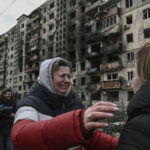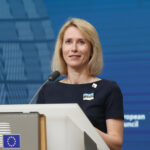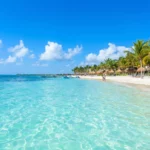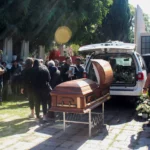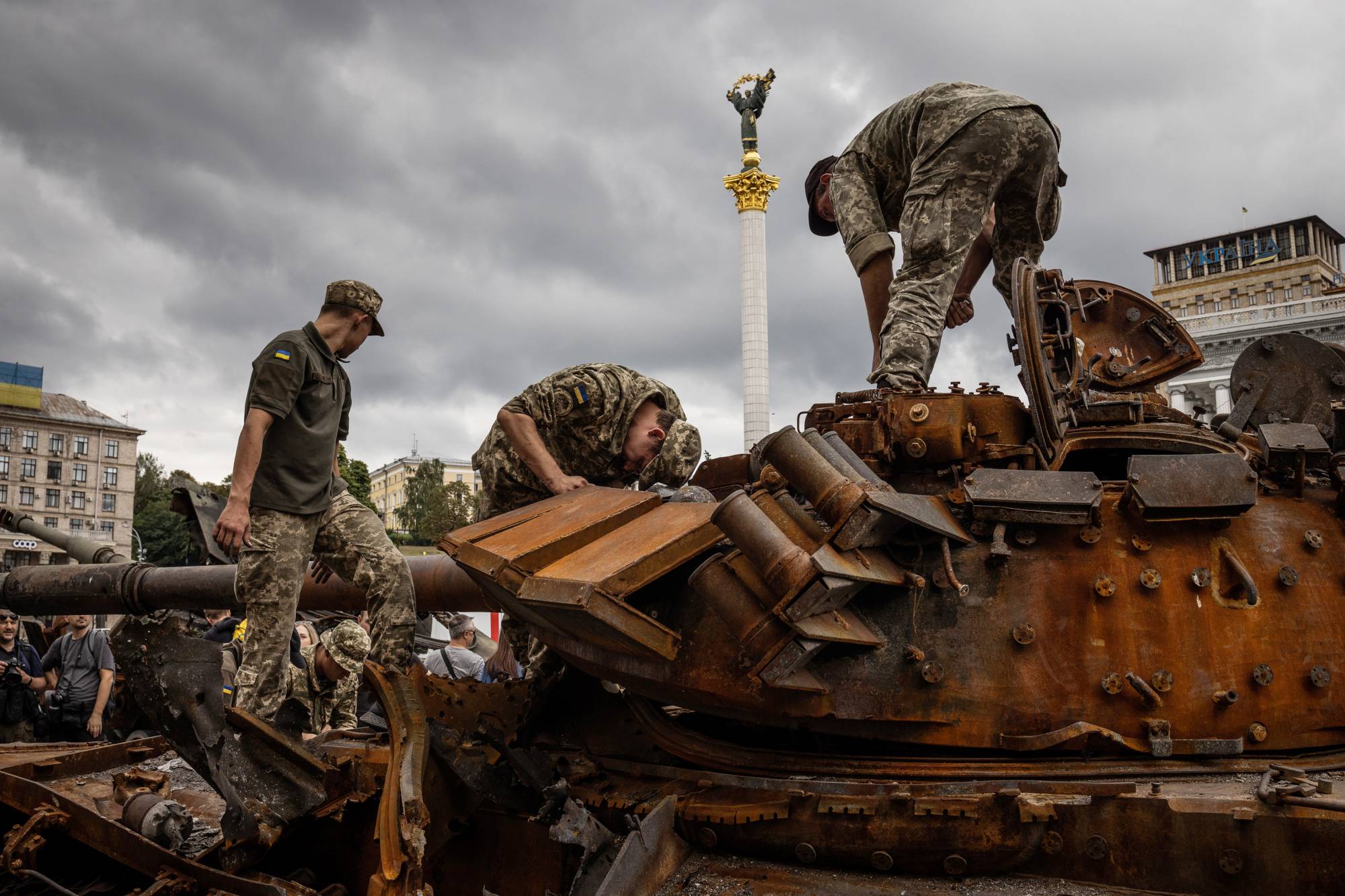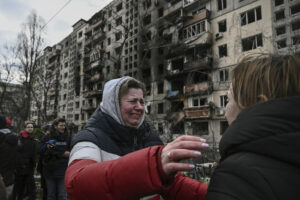Until one short week ago, the geopolitical balance in Ukraine could be likened to Zugzwang, a word describing a delicate point in a board game when taking any move will probably put a player at a disadvantage.
For the west, as it prepared to gather with other world leaders at the UN general assembly in New York, there seemed to be no good option, apart from hanging on. It could hardly retreat in its support for Ukraine – too much of the liberal democratic order had been declared to be at stake, too much Ukrainian blood spent, too much western treasure expended, including $5bn (£4.27bn) a month just to finance the Ukrainian state. The US alone has spent $15.5bn since the start of the war.
Yet if the west continued with its plan to squeeze Russia economically, an increasingly desperate Putin was certain to turn off all the gas coming from Russia, not just that coming via the Nord Stream 1 line, but all pipelines. Given the refusal of oil producers, from Riyadh to Tehran, to come to Europe’s rescue and increase oil production, millions of European consumers are at risk of freezing or going bankrupt this winter.
The cost of shielding European electorates from that rise in electricity and gas – now put at €500bn (£433bn) – still threatens to wreck budgets, with central banks under pressure to keep raising interest rates to stem inflation running at 9.8%, the highest in 25 years.
While all these calculations do not disappear, they have been radically altered as a result of the surprise Ukrainian military advance. Justin Bronk, at the British thinktank Rusi (Royal United Services Institute), said: “Into the winter, regardless of how much territory Ukraine takes before weather shuts things down for both sides in November, there can be no more doubts that Ukraine can win, if supported properly. The line of argument that it is not worth continuing to supply Ukraine because it prolongs the stalemate is no longer an argument. Victory is now visible and credible.”
Annalena Baerbock, the German foreign minister, speaking in Kyiv as the impact of the offensive took shape on Saturday, said it was “a moment of hope”. After a further 24 hours of advances, a fierce debate in German politics had broken out about the direct provision of heavy weapons, including Leopard tanks. Agnieszka Brugger, the Greens’ deputy group leader in the Bundestag, said: “All options have to be put to the test again without any ban on thinking. These are crucial months for the people of Ukraine and for order on our continent.”
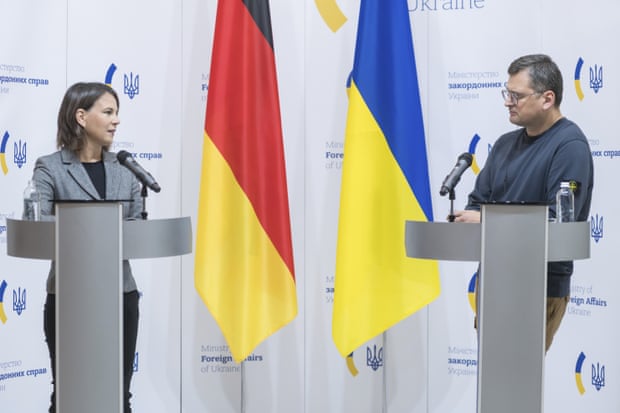
Instead of offering only a costly grinding stalemate, in which – in Vladimir Putin’s words – European prosperity is thrown into the furnace of sanctions, western leaders can now talk of the de-occupation of Ukraine, and sound plausible. “This counteroffensive shows that we can win,” said Ukraine’s ambassador to the US, Oksana Markarova. The French ambassador to Ukraine, Étienne de Poncins, even speculated somewhat prematurely that autumn could be “the season of victory”. If so, minds will have to turn to what methods Putin might employ in order to prevent collapse.
But for the moment, the raging war of narratives will not cease, including at the UN next week – itself largely marginalised as a body by Russia’s veto at the security council. The Russian foreign minister, Sergei Lavrov, will be cornered if the current military reverses become more stark, but his ability to brush aside all criticism – and reshape the truth – is legendary.
Ukraine’s advance will also unnerve Beijing, since it promised Russia a friendship without limits. As Richard Haass, the president of the Council on Foreign Relations, points out: “It was China’s purpose to divide the west, but its alignment with Russia has done the opposite.”
Moreover, if China is to remain an effective counter to the US, one that attracts non-aligned states, it badly needs Russia to succeed in eastern Ukraine. The biggest loser from a Russian defeat in Donetsk, in terms of prestige at the UN, might be China’s president, Xi Jinping.
But even now western leaders will look anxiously out from their chandeliered offices for signs of whether Europe will buckle or stand firm. The pressure is not yet off.
Nathalie Tocci, the director of the Italian Institute of International Affairs, argues that it is still a test of two conflicting views of Europe’s resilience, one held by Putin and the other by Jean Monnet, the spiritual founder of the EU.
Putin, she says, assumes western Europe’s prosperous, but morally corrupt, liberal democracies will ultimately confirm their feeble inability to endure pain. He cannot imagine Europe throwing itself over an economic cliff – “all for a country that in his mind does not even exist”. By contrast, Monnet argued in his memoirs that Europe’s strength “is forged in crises, and will be the sum of the solutions adopted for those crises”.
Every time Europe is challenged and falls, whether Covid or the euro, it will not only lift itself up, but move forward into the next stage of adjustment and integration, thus turning crisis into opportunity. Tocci says it is still impossible to tell which interpretation of European resilience will ultimately triumph.
Moscow’s disinformation units of course like to project a Europe in a state of revolt against rising prices and its uncaring elites. The evidence for a populist revival so far is patchy.
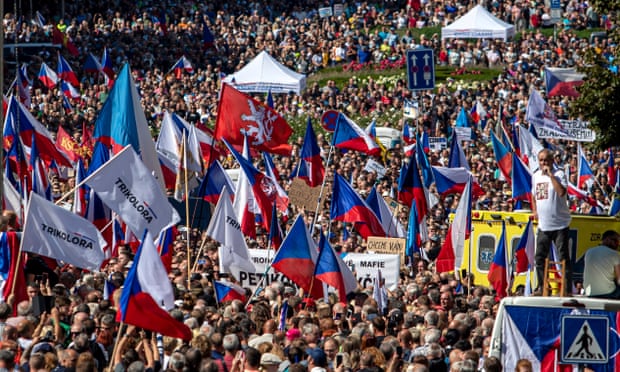
In Prague, 70,000 turned out in Wenceslas Square on 3 September to protest against the price rises, splitting the government in its reaction, with the pro-western prime minister, Petr Fiala, describing the organisers as Putin fifth columnists who believe the solution to high energy prices is to leave Nato and the EU. By contrast, Pavel Blažek, the justice minister, said the people in the crowd were not Putin fanatics, but people worried about falling living standards who deserved to be taken seriously. The organisers said another Czechia First demonstration was planned for later this month. Their slogan is simple: “This is not our war.”
The Slovakian government teeters on the brink, but largely over internal issues, and in parliamentary elections in Italy and Sweden, surging rightwing populists have played on the consequences of the war, but only indirectly. Support for Ukraine in the US is largely bipartisan, and few US politicians like to disassociate themselves from what looks like a US military success.
Overall, a Eurobaromoter poll conducted in June and July found 68% of Europeans supported providing arms to Ukraine, while 78% supported economic sanctions imposed by the EU on the Russian government, companies and individuals. More recent German polls for ZDF showed 70% support for sanctions against Russia, and an extraordinary 90% support among German Green supporters. The first attempt by German leftists to start “a hot autumn” ended in failure with few answering the call to take to the streets in Cologne. The reputations of individual politicians, such as Robert Habeck, have taken a hit, but not the war they advocate.
Moscow propagandists will try to portray Europe as on the brink of an 1848-style insurrection, and Nato will counter this as the work of people padlocked into fantasy. Everything will turn on the effectiveness of the measures the EU can agree to cap the price of gas, or subsidise the costs. No one denies the massive political sensitivity. The White House chief of staff, Ron Klain, tweets most days the currently falling price of gas.
But what has been potentially most significant diplomatically in the past month is that European leaders, after a distinctly divided initial response to the invasion in early spring, appear to have recovered their nerve, and had done so even before the surprise breakthroughs of the latest Ukrainian military offensives.
In a series of frank reflective speeches, leaders in Paris, Berlin and Washington in late August and early September emerged resilient and recharged, ready to associate themselves in a fuller ideological way with a war that may last through winter. The speeches may have been in part a diplomatic offensive by Berlin and Paris trying to reassure Baltic and east European states, but they were also a message of determination sent to their own electorates.
Baerbock, for instance, in an article in Die Zeit, argued: “We must face the facts: this Russia will for the foreseeable future remain a threat to peace and security in Europe. This may be tough to swallow,” she admitted. “We have to assume that Ukraine will still be needing new heavy weapons from its friends next summer.” She later said she would stick to her promises to Ukraine, whatever voters might think.
Equally, the German chancellor, Olaf Scholz, in a major speech on 29 August delivered in Prague, tried to lay the foundations for a profound renewal of Germany’s European policy. The speech was in part a response to an address made by Macron in 2017, but it was also his argument for how Europe had to respond to the invasion of Ukraine. It ended with a rhetorical question: “When, if not now, are we going to build a sovereign Europe? Who, if not us, can protect the values of Europe?”
Macron, too, in a marathon speech to French ambassadors on 1 September accepted there was no way back with Putin, an admission that requires him implicitly to acknowledge that his bet on opening up to Russia to tie it to Europe, symbolised by the Fort de Brégançon regancon summit in 2019, has not paid off.
Yes, he still stressed French freedom of manoeuvre from the US over China. He would not apologise for talking to Putin, since if he stopped, Putin’s sole interlocutor would be Turkey, and he was silent on whether Putin deserved humiliation, something he had opposed in May.
It appeared as if his belated visit to Kyiv on 16 June alongside the the Italian prime minister, Mario Draghi, and Scholz – where the leaders called for Ukraine and Moldova to be allowed to start the EU candidate accession process – had finally converted him. He put the invasion in the context of a challenge to liberalism as “the indisputable model and culmination of humanity”. Russia, he said, “had not just undermined the principles upon which we built peace over decades – the territorial integrity of states”, but created a contemporary relativism that risked being “completely irreversible”, and “extremely dangerous for the inner workings of our democracies”. This was not a war of territory, or Ukrainian nationalism, but of values.
But running through these speeches, read by few, was also a glaring admission of liberal democracy’s weakness. Baerbock in speaking to her ambassadors was the most frank. She said while it was true that in March, 141 countries condemned Russia’s invasion at the UN, “countries representing more than half of the global population did not vote with us. Moreover, many countries do not support the sanctions against Russia.”
Apart from the suffering in Ukraine, she said, “this was the single fact that had bothered her most in the past six months”, to the extent that “it is something I haven’t been able to stop thinking about”.
She said the west needed “to understand why, when there is a choice between right and wrong, between victims and perpetrators, a country would simply abstain”. Too many countries saw Ukraine as a regional war. “They ask again and again where we were when conflicts raged in their homes.” Her solutions were manifold, but rather than providing fait accompli, something that does not engender trust, the west needed to listen to these abstentionists.
Her French counterpart, Catherine Colonna, made a similar point in her address to the French diplomatic corps, warning: “The will to seek compromises is losing ground a little further every day, faced with the desire to impose views without compromise, or to accept deadlock.” She called for a French “combative diplomacy” and for French diplomats to start to become clearer message carriers in this new “competition of values”.
Macron also warned that “the abstention countries” represented a mass of humanity. “This means that this good part of humanity does not fully understand what is happening.” He said foreign leaders told them of their disenchantment with the west. “Many are saying to us: ‘Is this model so great? You seem so unhappy. We watched what happened at the Capitol last year, we can see you at home, extremism is on the rise everywhere. You can’t solve extreme poverty. You’re arguing over the climate.’”
Although Russia was the protagonist, lurking behind the scenes, he claimed it was China “that had structured the camp of abstention, seeks to push its deep interests and to basically establish a split in the international order by establishing a narrative that says that these rules are centred on US power”.
The wake-up call about this shallow support for western values in this new multipolar world raises deep historical questions, and at minimum underlines how the end of the cold war deprived the west of one of its most effective means of moral validation.
Ukraine is itself trying to deepen its international support by broadening its diplomatic contacts, but it is a complex process. Dmytro Kuleba, Ukraine’s foreign minister, admits he is not very popular in India after telling its leadership that the oil they buy from Russia is laced with Ukrainian blood. As for China, he admits little progress has been made.
It is possible that something permanent will emerge from the camp of abstentionists such as a revival of the dormant non-aligned movement, but that movement has never had a cohesive ideology.
But if the western alliance is to attract new friends, it will require more than one western-sponsored climate change conference or presidential tour of Africa to undo the damage accumulated in the past.
Source : The Guardian


